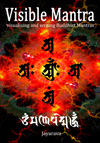

pra jñā pā ra mi tā
Prajñāpāramitā is a goddess of Wisdom. She is closely associated with the Perfection of Wisdom tradition, and indeed her name is usually translated as "Perfection of Wisdom". The Perfection of Wisdom tradition is one of the two great philosophical traditions of Mahāyana Buddhism. It is closely associated with Nagārjuna who is said to have retrieved the texts from the Nagas. Prajñāpāramitā is the personification of the prajñā. Vessantara calls her "the book that became a goddess", and the tradition itself refers to her as the "Mother of all the Buddhas".
There are several forms of Prajñāpāramitā although she is always portrayed as a mature woman, with full breasts. In this four armed form her two main arms are held in the meditation mudra. The upper right arm is lightly holding a vajra, while the upper left arm holds the Aṣṭasahaśrika Prajñāpāramitā Sūtra - the Perfection of Wisdom in 8000 lines.
Seed Syllable

dhīḥ
The seed syllable of Prajñāpāramitā, dhīḥ, is also associated with Mañjuśrī.
See also my essay The Seed Syllable of Perfect Wisdom.
Mantra
Siddhaṃ

Tibetan - Uchen

Transliteration
oṃ āḥ dhīḥ hūṃ svā hā
Clearly this mantra is not translatable into English as it is composed entirely of seed syallables (taking svāhā as a bīja)
To date I have not found any exegesis of this mantra - JR
The syllables individually: oṃ |
āḥ |
dhīḥ |
hūṃ |
svāhā
Comments
Because of interest in the Heart Sūtra mantra, which is also known as the "Prajñāpāramitā mantra" this mantra is often overlooked. People are often surprised to discover that Prajñāpāramitā has her own mantra.
The text mentioned above, the Aṣṭasahaśrika Prajñāpāramitā Sūtra, along with its verse summary the Ratnaguṇasaṁcayagāthā, is the earliest of the Perfection of Wisdom text. It was first translated into Chinese in 179 CE, which puts it amongst the the first Buddhist texts to be translated in China. The Aṣṭasahaśrika is the archetypal Prajñāpāramitā Sūtra.
Another Prajñāpāramitā mantra
siddhaṃ

Transliteration
oṃ na mo bha ga va tyai ā rya pra jñā pā ra mi tā yai
oṃ namo bhagavatyai āryaprajñāpāramitāyai
translation
oṃ homage to the blessed noble perfection of wisdom
Comments
This homage is found at the beginning of Prajñāpāramitā sūtras, and Edward Conze often quotes it in his translations of Prajñāpāramitā texts. Conze, in a poetic mood, has also translated it as: Oṃ Homage to the Perfection of Wisdom the Lovely, the Holy!
Bhagava means "fortunate", or "blessed". It is one of the most common ways of referring to the Buddha and is now frequently translated as the Blessed One. Ārya means "noble", and originates from the word which the Vedic speaking tribes of Central Asia used to refer to themselves in contradistinction to the indigenous tribes of India and Persia. The word Iran, is a Persian version of the word Āryan.
Other Resources
- Dharmacari Vishvapani has composed a pūja to Prajñāpāramitā which contains this mantra and others.
- Essay on the seed syllable of Prajñāpāramitā, dhīḥ on Jayarava Rave.
- Talk six of six on the Buddhist Wisdom Teachings by Dharmacari Ratnaghosa mentions the mantra with an extract from "Meeting the Buddhas
"





